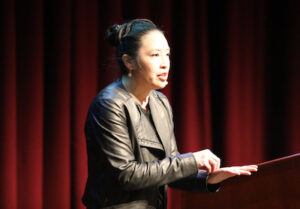 Asian Americans and Pacific Islanders (AAPI) have long endured discrimination influenced by nearly two centuries of history and exclusionary laws, said University of Maryland professor Janelle Wong, who explained that law and policy play critical roles in reversing discrimination.
Asian Americans and Pacific Islanders (AAPI) have long endured discrimination influenced by nearly two centuries of history and exclusionary laws, said University of Maryland professor Janelle Wong, who explained that law and policy play critical roles in reversing discrimination.
“The story of Asian Americans has been shaped by these two dominant stereotypes: the ‘model minority’ myth and the ‘forever foreigner’ stereotype,” said Wong, who was this year’s Hong Kong Distinguished Lecturer. “Both of those stereotypes are the products of both history and laws. And the experiences of Asian Americans are deeply connected with other minority groups in the United States. When disparities are shaped by policy, their solutions must also come from policy.”
Fears by white leaders in the mid-19th century that Chinese immigrants would bring anti-democratic and anti-Christian values to the country ultimately resulted in the 1882 Chinese Exclusion Act, which banned immigration of Chinese laborers and later expanded to ban people from all over Asia. Since that time, anti-Asian sentiment and violence has been “embedded” in America, Wong said, noting that it mirrored the timeline but existed on a smaller scale than anti-Black racism and violence.
A “model minority” stereotype emerged because of exceptions to exclusionary laws that allowed Asian immigrants to come to the U.S. if they were highly educated, wealthy, or highly skilled, Wong said. Today, more than 50 percent of Asian Americans over the age of 25 have college degrees, compared with 36 percent for all Americans over 25. Still, AAPI citizens face a “forever foreigner” status, even if their families have been in the country for generations, Wong said. “A signature experience for Asian Americans is being asked, ‘Where are you from?’” she said.
“The story of Asian Americans has been shaped by these two dominant stereotypes: the ‘model minority’ myth and the ‘forever foreigner’ stereotype. Both of those stereotypes are the products of both history and laws. And the experiences of Asian Americans are deeply connected with other minority groups in the United States. When disparities are shaped by policy, their solutions must also come from policy.”
– Dr. Janelle Wong
Wong also discussed the pending Supreme Court case Students for Fair Admission (SFFA) v. President and Fellows of Harvard College, which alleges that Harvard University has intentionally discriminated against Asian Americans in the admission process. The plaintiffs, Wong said, are fighting to eliminate affirmative action policies that consider an applicant’s race.
Wong argued that the case ignores the value of diversity in learning environments—something that benefits all students, including those who are Asian, white, or other students of color. U.S. law already prohibits quotas in admissions, Wong said. Instead, affirmative action laws create better school environments.
“Race can never be the primary or only factor in college admissions,” she said. “No one gets into college just because they checked a box. We know, from research, that a more diverse classroom environment creates better learning outcomes for students.”
Wong is a professor of American Studies and Asian American Studies at the University of Maryland. She has authored or co-authored four books and written dozens of scholarly articles on issues facing Asian Americans.
She is the co-director of AAPI Data, a publisher of demographic data and policy research on Asian Americans and Pacific Islanders, and a research advisor for APIA Vote, a nonpartisan organization that works to mobilize Asian Americans and Pacific Islanders in electoral and civic participation. She has also contributed legal briefs in notable court cases related to affirmative action and voting rights. She attended UCLA as an undergraduate and received her Ph.D. from the Department of Political Science at Yale University.
The Hong Kong Distinguished Lecture Series invites speakers who help raise Milton’s awareness about issues of concern in Asia. These speakers also help us better understand the cultures, art, and history of Asian countries. Former Trustee Helen Lin, Class of 1981, along with more than 100 graduates living in Hong Kong, established the series in 1998.